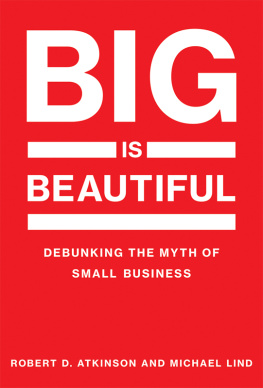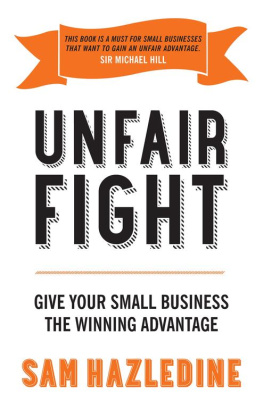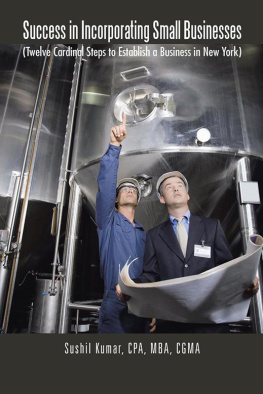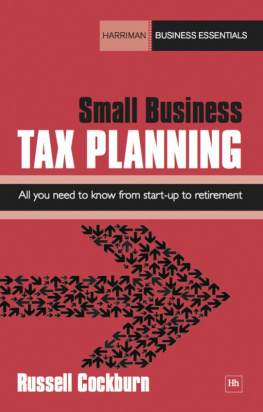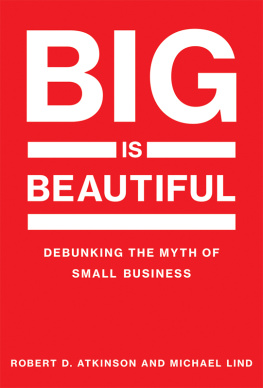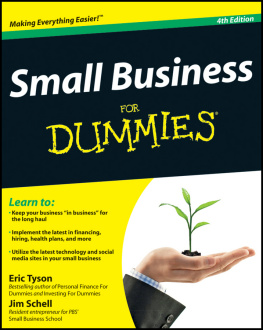Big Is Beautiful
Debunking the Myth of Small Business
Robert D. Atkinson and Michael Lind
The MIT Press
Cambridge, Massachusetts
London, England
2018 Massachusetts Institute of Technology
All rights reserved. No part of this book may be reproduced in any form by any electronic or mechanical means (including photocopying, recording, or information storage and retrieval) without permission in writing from the publisher.
This book was set in ITC Stone Sans Std and ITC Stone Serif Std by Toppan Best-set Premedia Limited. Printed and bound in the United States of America.
Library of Congress Cataloging-in-Publication Data is available.
ISBN: 978-0-262-03770-9
eISBN: 9780262345651
ePub Version 1.0
Preface
Small business is the basis of American prosperity. Small businesses are overwhelmingly responsible for job creation and innovation. In addition, small businesses are more productive than big companies. As they power the American economy, small business owners are the basis of democracy in America, whose health depends on the existence of a large and growing number of self-employed citizens. Yet Washington, controlled by big business and engaged in crony capitalism, systemically discriminates against small businesses.
Every word in the previous paragraph is false or misleading. Small businesses create many jobs but they also destroy many jobs because most small businesses fail. Virtually all big firms are more productive than small onesthat is why they got big and that is why they pay their workers more. Only one particular kind of small firm contributes to technological innovation, the technology-based startup, and its success depends on scaling up, either on its own or in affiliation with large corporations, which are themselves extremely innovative because they can marshal the resources needed to invest in innovation.
Nor is it true that democracy and liberty in the United States depend on maximizing the number of Americans who are self-employed. In the United States as in other nations, economic development is marked by the replacement of self-employed farmers and peddlers and artisans by a majority of citizens who work for medium-sized to large firms. Civil rights and voting rights and freedom of expression are far safer in todays American economy with its many big corporations than they were in the agrarian America of the past, when a small-proprietor majority coexisted with slavery, segregation, and the denial of rights to women and sexual minorities.
All of this is demonstrably trueand we have written this book to demonstrate it. Why, then, is small business the most sacred of sacred cows in the United States, and other nations as well?
The cult of small business in America can be attributed to two schools of thoughtproducer republicanism and market fundamentalism. Producer republicanism, which holds that a republic must rest on a majority of self-employed small farmers and small business owners, is a relic of the Jeffersonian agrarian republicanism of the preindustrial era. Producer republicanism has been anachronistic for more than a century, although it enjoys periodic short-lived revivals and is enjoying one at present among progressives.
The small business cult is also reinforced by market fundamentalism. Market fundamentalism assumes that all markets are naturally competitive markets atomized among many small firms, in which competition, in the absence of government favoritism or business cheating, would soon whittle down any firm that temporarily got bigger than the rest. This is a good description of firms in technologically stagnant, labor-intensive sectors of the economy, such as local shoe repair companies. But it ignores the centrality in modern advanced economies of such sectors as manufacturing, transportation and infrastructure, and high-tech retail, which are characterized by economies of scope and scale. In these industries, the supposed laws that students learn in Econ 101 do not apply: monopoly can be efficient and rivalry among a few big oligopolistic firms can drive innovation.
These are the themes we develop in Big Is Beautiful. Following a discussion of the small-is-beautiful rhetoric in chapter 1, in chapters 2 through 7 we detail the advantages of scale that have led businesses in America to become big and continue to get even bigger.
In the second half of the book, chapters 8 through 13, we turn to the politics and policy of business. Political corruption is a genuine problem, but public policy is warped as much or more by small business pressure groups as by large firms. We argue that from the nineteenth century to the twenty-first, American antitrust or competition policy has been warped by a harmful bias against big firms as such. While using antitrust legislation to assault many firms guilty only of the crime of success, the US government, motivated by a confused mix of populist and free market ideology, has showered favors on small firms, the greatest beneficiaries of so-called crony capitalism.
We conclude by calling for size neutrality in government policies toward businessincluding in taxation, financing and subsidies, procurement, and regulationcombined with a focus on new high-growth business, not small business, that is, on dynamic startups that can transform the economy, not on small businesses whose owners do not engage in innovation and do not seek growth.
Our motive in writing Big Is Beautiful is not hostility toward small firms, some of which have vital functions to play in a dynamic economy that includes firms of all sizes as well as nonprofit research institutions and growth-promoting government agencies. Our intervention in this debate is motivated by our conviction that boosting Americas economy-wide productivity makes all other public policies easier to achieve. The best way to boost productivity is to remove obstacles to the replacement of small-scale, labor-intensive, technologically stagnant mom-and-pop firms with dynamic, capital-intensive, technology-based businesses, which tend to be fewer and bigger. The current small is beautiful belief, held by both sides of the political aisle, represents a major barrier to that necessary and beneficial reallocation. But doing so will require debunking the small-is-beautiful myth while at the same time working to restore the reputation of large firms as engines of progress and prosperity.
The eighteenth-century writer Jonathan Swift said that whoever could make two ears of corn, or two blades of grass, to grow upon a spot of ground where only one grew before, would deserve better of mankind, and do more essential service to his country, than the whole race of politicians put together. We should not let nostalgia for the village life and small-scale economies of an idealized past blind us to the benefits of the kinds of businesses that are most likely to make two ears of corn or blades of grass grow where only one grew before.
Acknowledgments
We thank the Smith Richardson Foundation for the financial support that made the research and writing of this book possible. In addition, we would like to express our appreciation for the helpful comments of the three anonymous reviewers in the Smith Richardson review process and the three anonymous reviewers in the MIT review process.
Rob Atkinson thanks John Wu and Kaya Singleton for research and editorial assistance and his wife, Anne-Marie, daughter, Claire, and son, David, who patiently supported his writing efforts during family time.
I History and Present Trends
Belittled: How Small Became Beautiful
Small is beautiful. And big is bad. That is the consensus shared by Americans across the political spectrum, from the anticapitalist left to the libertarian right.

